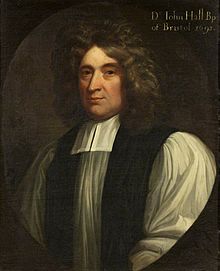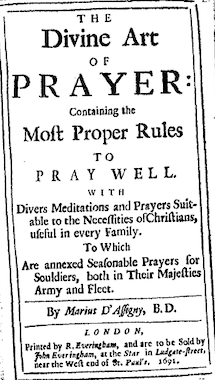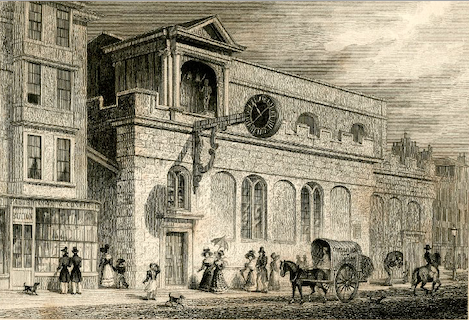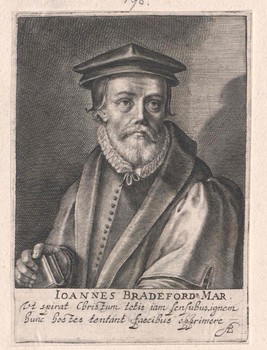Psalm 116:12. What shall I render unto the Lord for all his benefits towards me?
Soliloquy.
It is the querulous and ungrateful humour of man to keep an exact reckoning of his afflictions, most of which are but imaginarie, and to murmur against God, but to forget his benefits, and take no notice of them, no not when he fills himself with them. Although there is none so afflicted upon earth, but hath more reason to thank God than to complain, though he had nothing but life and the way open for repentance.
To praise God for his graces is the highest dutie of the Christian, and together his highest felicitie. It is the everlasting imployment of glorious soules in heaven to praise God for his salvation, crying with a loud voice, Salvation belongs to our God which sitteth upon the throne and to the Lamb. To which the armies of angels answer, Amen, blessing and glorie and wisdome and thanksgiving and honour and power and might be unto our God for ever and ever. Amen.
Let us now, my soul, joyne with that consort of heavenly praises. Let us anticipate the date of our felicitie, singing our part already in the musique of angels. And what have I else to render unto God for his benefits, but to employ for his praise the gift he made to me of a soul capable and desirous to know him, to love him, and to praise him?
But when I come to think on that numerous universalitie of all Gods benefits upon me, I feel my meditation swallowed up in a bottomless gulf. Nature, providence, and grace call me all three together to admiration and thankfulness.
Nature as the nearest presents me to myself, and shewing me my body made with such divine art and symmetrie, teacheth me to say with David, I will praise the Lord for I am wonderfully made (Ps. 139:14). In that bodie God hath lodged a soul stamped with his own image, endowed with reason, and inabled with intellectual faculties. To comprehend what I owe to God for my bodie only, I should value every piece one by one, and think what I would refuse to part with them. What would I take for one of my arms? Not millions. What for an eye? Not a whole world. What then for both? What for health and life? I must account that I possess as much treasure as I would refuse, rather than be deprived of every one, and of any one of these natural goods; and upon that account I must estimate my obligation, and the greatness of my debt to my great benefactor.
How much then do I owe unto God for my soul, which is the breath and the living image of God, in comparison of which this bodie which we so much value is of no value. To understand my obligation to God for my soul I should know her nature and her work. That knowledge is too wonderful for me. But as darkness teacheth us to value the light, I learn to admire the value of a soul in her right sense, when I see one out of it, a man become a beast. It strikes me with horrour, and makes me exclaim, how much am I indebted to God, for giving and preserving unto me a reasonable soul?
And when from within I look without, what a numberless multitude of benefits of God are crowding about me! The earth that bears me, the aire which I breath, the heaven that shines upon me, the plentie of nature that feeds me, her varietie that delights me, the several creatures that serve me. What readiness, what utilitie, what dutiful attendance of so many good things which God made for me!
And all these goods of nature are managed by his providence for my use. To providence I owe the goodness of my Father, the tenderness of my mother, that loving care whereby I was brought up from the cradle, supported in the infirmitie of mine infancie, and conducted in the simplicitie of my youth. To the provident care of my heavenly Father I owe the sucking, next after my nurse’s milk, of the principles of pietie and honestie, which to me since have been preservatives against those mischiefs which I have seen others run into for want of good breeding. When I see so many persons disfigured with sickness, their limbs broken, their bodie spoiled by sad accidents; others groaning under the lash of ill renown, perhaps wrongfully, some miserable out of want, some out of plentie, some opprest by wicked neighbours, some by their own melancholy, I cannot but think myself well used, notwithstanding all the infirmities within and difficulties without, which I must wrestle with. And I must exalt the bountie of God, who so carefully preserveth my person, my peace, and my reputation.
What private helps did God send me in the publick ruines! What wayes did he open to me where there was no way! How graciously, how miraculously did he make manna fall before me when bread failed, and wrought for me a subsistence out of the hardest natures and businesses, as it were fetching water out of the rock! How loving are his very chastenings, denying me the things that I desired, to give me better than I desired; and sending me the things that I feared, to make them occasions of blessings!
I should never have done numbring the benefits of his providence; but here his grace interrupteth the reckoning ascribing to herself all the blessings both of providence and nature. For it is out of that love before all times in his beloved son, that he feedeth me and furnisheth me with all the goods of nature, and assigneth his angels for my keepers which carry me in their hands.
But what are all these great benefits but small productions of the inestimable treasures of that grace whereby I enter upon all the rights of Gods children? Oh that I could once apprehend what a high grace it is to have God for my father, Christ for my brother, his kingdome for mine inheritance, yea, God himself for my portion forever? How gracious is his redemption! How free is his pardon! How precious is his loving kindeness! What fulness of joy is at his right hand! What eternal pleasures in the contemplation of his face! And in that expectation, how comfortable is the presence of his good Spirit in my heart, giving me eares to hear his word, and a sincere desire to keep it, strengthening me in my troubles, raising me in my falls, wounding my soul with contrition for my sins, and then healing it with faith in his promises! O pretious guest! O blessed company! O Paradise upon earth! O beginning of the kingdome of heaven! Bless the Lord, O my soul, and all that is within me bless his holie name. Bless the Lord, O my soul, and forget not all his benefits (Ps. 103:1).
Prayer
Most merciful Father, when I compare mine indignitie with the greatness of thy benefits, I feel in my heart a compound of humble repentance and heartie thankfulness. For what am I by nature but a child of wrath, conceived in iniquitie, which original corruption I have since increased with innumerable actual transgressions? And yet, Lord, where sin abounded thy grace hath abounded much more, and thine infinite love hath prevented me when I was thine enemie. Lord who am I, that thou great maker and Soveraign of heaven and earth, possest with infinite glorie, and dwelling in a light not to be approacht unto, wouldest grace me so much as to make me one of thy children, and inrich me with the inheritance of thy kingdome? That thou wouldest give me thy beloved Son for the price of my redemption, which I may present unto thee by faith? That thou wouldest give me thy good Spirit to seal my adoption, and work my regeneration, and say to my soul, soul, I am thy Salvation.
With what wonders of mercy was that salvation purchased for me? Thine only Son in whom thou art well pleased must put on an infirm flesh like unto mine, to make me like unto him by his good Spirit. He must make himself a servant to make me free. He must suffer death to give me life. He must crie, my God my God why hast thou forsaken me, to bring me back to my God whom I had forsaken. He must overcome death to intitle me to his victorie. He must ascend into heaven, and there sit at the right hand of his Father, that I might be blest with all spiritual blessings in heavenly places in Christ (Eph. 1:3).
O Father of mercies, the great, the good, the wonderful, be pleased to adde to these thy mercies one more, even the thankfulness of my heart, answerable, as far as man’s capacitie can reach, to the greatness of the obligation. O that thou wouldest grant me according to the riches of thy glorie to be strengthened with might by thy Spirit in the inner man. That Christ may dwell in my heart by faith, that I being rooted and grounded in love, may be able to comprehend with all saints what is the breadth and length and depth and height, and to know the love of Christ which passeth knowledge, that I may be filled with all the fulness of God (Eph. 3:16).
Most gracious God I expect from the riches of thy glorie to be filled in heaven with all thy fulness, by the blessed contemplation of thy face. But even in this present weak condition of mine, be pleased to poure into me some drops of that fulness, enough to fill this small frail vessel with thy love, and a feeling resentment of thy bountie. And as all things about me speak to me of thy love, so let all things help me to be thankful, and to acknowledge and love him that loved me so much in Jesus Christ.
‘Tis true, Lord, that even thine enemies enjoy out of thy bountie the light and heat of the sun, and the fertilitie of the earth, and in thee live and move and have their being. But I enjoy all these benefits with a better title and relish in the very bread which I eate, and in the aire which I breath, thine eternal love in thy beloved Son. For since thou hast elected me in him, and redeemed me by him, it is by him also and for his sake, that thou preservest my bodie and soul which he hath redeemed, and makest me to injoy the promises of the life that now is, and of that which is to come (1 Tim. 4:8).
What shall I render unto thee Lord for all thy benefits towards me? With what fatherly care hast thou fed, preserved, and defended me? What help of thy providence didst thou make me finde in the whole course of my life? With what vigilance and wisdome hast thou made me a way through a thousand dangers that beset me? With what compassion hast thou held me up when I was falling, and guided me when I went astray? How graciously hast thou moved me to repentance by thy word, by thy Spirit, by thy gifts, by thy rods, sometimes pulling me with fear as plucking me out of the fire, sometimes drawing me with love by temporal comforts, and by the sweetness of thy promises? How quick and powerful are the comforts of thy spirit, assuring me of thy reconciliation with me, and giving me a foretaste of eternal life?
Among thy many blessings I reckon it for a mercie, Lord, that thou didst not leave me without discipline, but hast exercised me with thy chastenings to awake my faith, warm my zeal, and make me to have recourse to the shelter of that very hand that smote me. I praise thee for not giving me all my desires in this world, that my heart might be weaned from it. O Soveraign Physician, in thy hand even poisons are remedies; and thou never didst send me affliction but in the end turned into a blessing, by thy wonderful wayes which fetch light out of darkness. Thus Lord, which way soever I look, whether to prosperitie or adversitie, whether to the goods of this world, or those of a better, whether to my desires frustrated, or to thy liberalitie in thy Son which passeth all my desires, I finde myself in all things obliged to glorifie thee.
What then shall I render unto thee for so many benefits? Lord I have nothing but thine. Then all that is thine I will render unto thee. I will consecrate unto thee this body and soul which thou hast made and redeemed, and so carefully preserved. I will employ mine understanding to meditate on thee, my heart to love thee, my mouth to praise thee, all my faculties to obey and please thee. And because my goodness extendeth not to thee, I will endeavour to make it extend to the saints here in the earth (Ps. 16:2) according to the measure of my abilitie; and to feed and cloath my Saviour Jesus in his members, as he hath fed me with the bread of life, and clothed me with the cloak of his righteousness, besides his care of me for the temporal. My God give me holy resolutions which may be attended with holy actions. My God grant that my life may be a continual thanksgiving in affections, in words, and in works. My soul doth magnifie the Lord and my spirit rejoyceth in God my Saviour, for he hath regarded the lowliness of his servant. Unto him that loved us and washed us from our sins in his own blood, and hath made us kings and priests unto God and his Father; to him be glorie and dominion forever. Amen.








